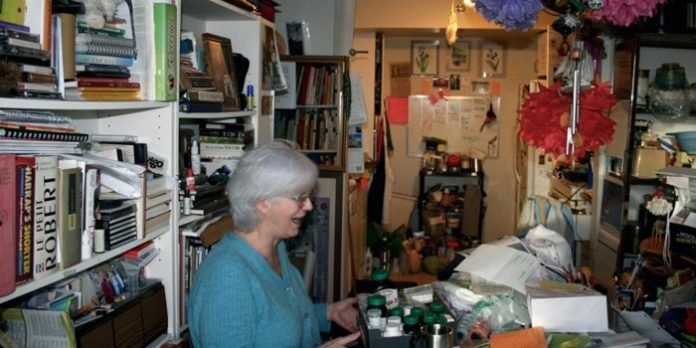With the 2020 FIN Atlantic International Film Festival going online, it is a prime opportunity for film lovers to check out some of the movies created by local filmmakers. And there is no better way than through the multiple short film programs on tap this year.
From comedies to science-fiction, animation and experimental films, these film shorts run the gamut of genres from established and emerging filmmakers alike.
Halifax Presents reached out to several local filmmakers to find out more about their films. First up is Kaila Bolton who gives us some insight into her 14-minute short Queen of Chaos, which screens as part of the Atlantic Shorts Program 3.
This interview has been edited.
Tell us about Queen of Chaos. What can audiences expect?
The film is a portrayal of a woman named Thérèse who identifies as a hoarder, but who prefers to call herself a “Queen of Chaos”. She opens up to the audience about her experience living with hoarding disorder and shares with us the struggles she faces. While there are clearly many hardships, there is also considerable beauty and joy in her life.
How did you find the story/what was your inspiration for the film?

I have spent a lot of time indirectly and directly thinking about human cycles of acquisition and disposal of material objects. My mom and I love thrift shopping together, and most of my things growing up were bought in second-hand stores. I also grew up observing, and later understanding, some of the behaviours and mentalities shared by myself and some of my family members that could be considered variations of (non-clinical) hoarding behaviour.
I wrote my undergraduate thesis in anthropology on hoarding behaviour and human perceptions of the environment. I met Thérèse through my participant recruitment for this project. When I got into filmmaking, I remembered her and her captivating laughter; I knew she would make a compelling character in a film. Thérèse talks openly about how mentally painful it is for her to see perfectly good objects thrown out in the trash. I wanted to make a film about her experiences and emotions – experiences and emotions that I believe will resonate with many others.
Why this particular film now?
This is a timely film, especially as the pandemic has forced many of us to spend much more time at home with our things and has led to a lot of decluttering in what some are calling a “pandemic purge.”
However, even before the pandemic, I believed it was important to make this film. In my teens, I would occasionally watch the television show Hoarding: Buried Alive, and I always found it fascinating. Yet I also felt uncomfortable about how these people were portrayed, and their behaviours sensationalized for shock value. Thérèse is committed to speaking out and educating people about hoarding behaviour. Together, we discussed how this film might help to combat negative stereotypes about hoarders.
What was your biggest challenge in making the film?
The last few days of filming were planned for March. These had to be cancelled because of the pandemic. My biggest challenge was rethinking the film at the editing stage without footage that would have led the film to include a few other characters and might have taken the story it in a slightly different direction. Ultimately, though, I’m really happy with how the film turned out!
What will surprise audiences about your film?
Hopefully, audiences will be surprised by how much they can relate to and develop a sense of empathy with Thérèse.
What do you hope audiences walk away talking or thinking about after seeing the film?
I hope people walk away with a better understanding of hoarding behaviour and with an alternative perspective on stereotypes of hoarders. I hope the film successfully creates a humanizing portrayal of Thérèse.
What’s next for Kaila?
I have a few ideas for new short film projects I want to create to build up a portfolio for myself as a filmmaker. I love people who have a unique perspective on life that can make us question and rethink our biases and prejudices. Hopefully, you’ll be seeing some more films of this nature from me soon!
The 2020 FIN Atlantic International Film Festival runs September 17-24. Visit finfestival.ca for a complete listing of film and tickets.


